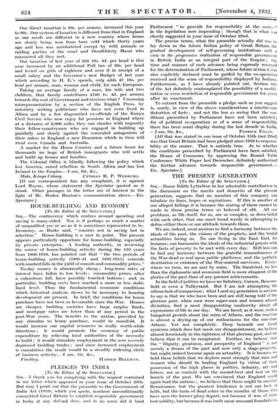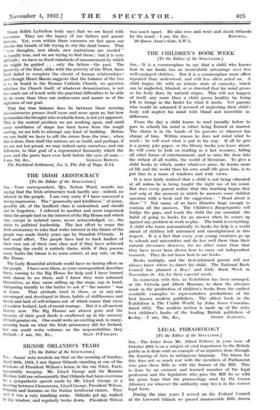THE PRESENT GENERATION
[To the Editor of the SPECTATOR.] SIR,—Dame Edith Lyttelton in her admirable contribution to the discussion on the merits and demerits of the present generation, suggests that no member of -this company can tabulate its fears, hopes or aspirations. If this is another of our alleged failings it is because the stating of them cannot be made in those precise terms so beloved of old. All our problems, as life itself, for us, are so complex, so dove-tailed with each other, that one must tread warily in attempting to define either them or our attitude towards them.
We are, indeed, most anxious to find a harmony between the ideals of the past, the visions of the prophets, and the brutal actualities facing us. No one living in the East End, for instance, can harmonize the ideals of the industrial priests with the facts of poverty to be met with every day. Still less can he find any harmony between the grateful remembrances of the War-dead so real upon public platforms, and the pathetic destitution or existence of the War-scarred survivors. Every- where we turn, we are met by ruins. The theatrical, no less than the diplomatic and economic field is more eloquent of the glories of the past than of any present achievements.
In the field of politics we have no Salisbury, Curzon, Beacons- field or even a Talleyrand. But I am not attempting the odious task of comparison ; what land mygeneration is anxious to say is that we who have been and are still being told of the glorious past, when men were super-men and women almost divinities, find a most disappointing mediocrity about all expressions of life in our day. We are faced, as it were, with a bungaloid growth about the ruins of Athens, and the reaction is almost a drying-up of our enthusiasms for the one-time Athens. Yet not completely. Deep beneath our facial cynicism which does but mask our disappointment, we believe almost ferociously in the rightness of that glorious past, and we believe that it can be recaptured. Further, we believe that the "Dignity, greatness, and prosperity of England" is not merely a dream of the past and now only a stage-property, but might indeed become again an actuality. It is because we hold these beliefs that we deplore most strongly that men and women who should be leading England by virtue of their possession of the high places in politics, industry, art and letters, are so content with the second-best and rest on the laurels of the past. We arc convinced that England could again lead the nations ; we believe that there might be another Renaissance, but the greatest hindrance is not our lack of faith, but the taste of dead ashes in the mouths of those who have seen the former glory depart, not because it was of rain- bow solidity, but because it was built upon unsound foundations. Dame Edith Lyttelton truly says that we are faced with vacuums. They are the legacy of our fathers and grand- fathers. Yet, even within these vacuums we feel upon our cheeks the breath of life trying to stir the dead bones. That new thoughts, new ideals, new aspirations are needed" is equally true, and we are trying to find them ; but it is very difficult ; we have no fixed standards of measurement by which we might be guided . . . only the failure—the past. The passivity of the East, alike with the activity of the West, have both failed to complete the circuit of human relationships ; and though Henri Massis suggests that the balance of the two is to be found in the Roman Catholic Church, we question whether the Church itself, of whatever denomination, is' not too much out of touch with the practical difficulties to be able to do more than bless our endeavours and assure us of the rightness of our goal.
That the true balance does lie between these seeming inconsistencies presses itself more and more upon us, but how to translate the thought into workable form, is not yet apparent. This is the central problem we are working upon, and until some semblance of shape has been hewn from the rough casting, we are loth to attempt any kind of building. Before we can build we have to sift the errors from the true ; when this is done, then shall the nations see us build, and perhaps, if we are not too proud, we may indeed carry ourselves, and our followers, to that goal of a regenerated humanity which the seers and the poets have ever held before the eyes of man.—











































 Previous page
Previous page